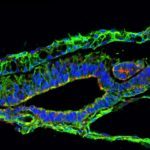Présentation
During embryonic development, both biochemical and mechanical cues establish the cell differentiation patterns that shape tissues and organs. While the role of signaling molecules has been widely studied, how mechanical forces affect progenitor cell differentiation/renewal in developing organs remains largely unknown, mainly because of a lack of technologies allowing quantitative measurements of tissue mechanics in vivo. Using novel force transducers that we have recently developed to measure cell-generated mechanical forces within living embryonic tissues, we propose to unveil the role of cellular forces during the progressive formation of the vertebrate limb skeleton. To do so, we will both measure and perturb the differential forces within the differentiation and self-renewal progenitor zones of developing limb cartilages. Moreover, we will test the role of Fibroblast Growth Factor (FGF) signaling pathway (known to be necessary for limb progenitor cell maintenance) in modulating the endogenous distribution of cellular forces within this tissue. Finally, we plan to apply ectopic compressive forces on developing limbs using a custom-made microindenter while simultaneously monitoring the effect of such mechanical disturbance on chondrogenic differentiation in developing limbs. The combination of physics and developmental biology approaches promises to reveal how signaling pathways and mechanics interplay to control the progenitor cell maintenance/differentiation balance during development. We believe that the results from this project will establish a framework to understand the role of mechanical signals in development and set the stage for future experiments in many other organs.


